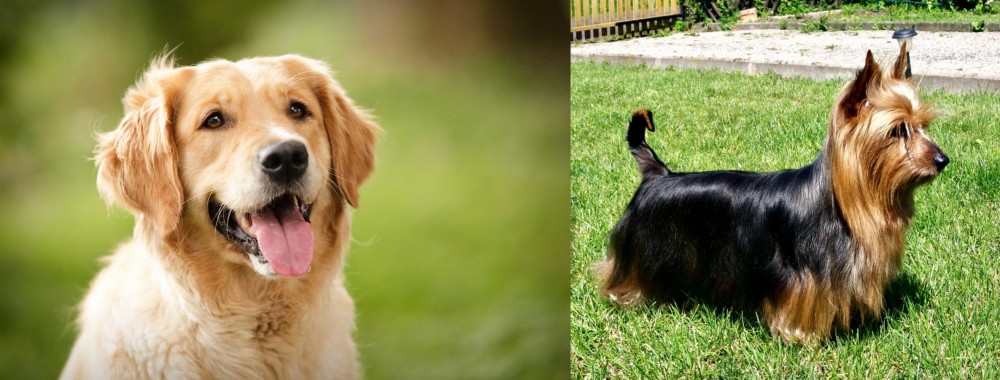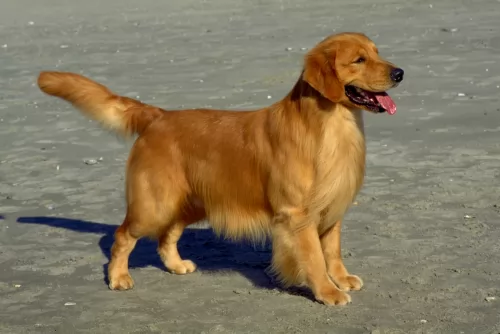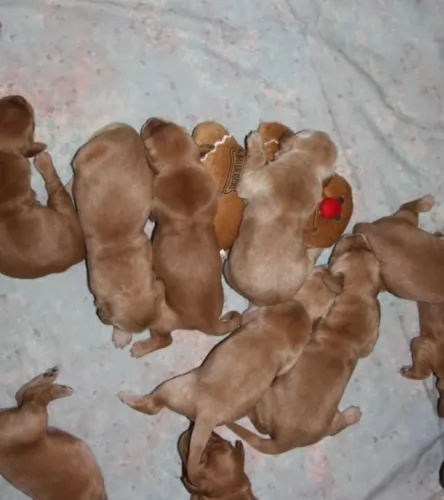 Petzlover
Petzlover Golden Retriever is originated from United Kingdom but Australian Silky Terrier is originated from Australia. Golden Retriever may grow 35 cm / 14 inches higher than Australian Silky Terrier. Golden Retriever may weigh 30 kg / 67 pounds more than Australian Silky Terrier. Golden Retriever may live 3 years less than Australian Silky Terrier. Golden Retriever may have more litter size than Australian Silky Terrier. Both Golden Retriever and Australian Silky Terrier requires Moderate Maintenance.
Golden Retriever is originated from United Kingdom but Australian Silky Terrier is originated from Australia. Golden Retriever may grow 35 cm / 14 inches higher than Australian Silky Terrier. Golden Retriever may weigh 30 kg / 67 pounds more than Australian Silky Terrier. Golden Retriever may live 3 years less than Australian Silky Terrier. Golden Retriever may have more litter size than Australian Silky Terrier. Both Golden Retriever and Australian Silky Terrier requires Moderate Maintenance.
 Many toy breeds have been bred for centuries and were kept as lap dogs and companion dogs. Known at first as ‘The Sydney Silk’ the Australian Silky Terrier originated in Australia, but before the 2nd World War, the Australian SilkyTerrier was all but unknown outside Australia.
Many toy breeds have been bred for centuries and were kept as lap dogs and companion dogs. Known at first as ‘The Sydney Silk’ the Australian Silky Terrier originated in Australia, but before the 2nd World War, the Australian SilkyTerrier was all but unknown outside Australia.
The toy breed came about by crossing the Yorkshire Terrier and the Australian Terrier, but further crossings contributed to the silky coat and the small size we are familiar with today. Despite this little dog being classified in the Toy Group, this spunky dog has the ability to hunt and kill rodents.
Victorian and Tasmanian breeders claimed to be originators of the breed, so the official name, Australian Silky Terrier, was adopted in 1956. Since recognition by the American Kennel Club in 1955, the breed has enjoyed a solid build up of fans.
 The Golden retriever always gets in the top ten ranking in USA. They are very intelligent and beautiful. Also they are very active and they take more years to mature as they like being silly and playful. Up-to four years they seem to play like a puppy. As the breed is set in for hunting waterfowl and ducks, they need a regular exercise such as walking or running. They love to roam in the yard and run in the beach.
The Golden retriever always gets in the top ten ranking in USA. They are very intelligent and beautiful. Also they are very active and they take more years to mature as they like being silly and playful. Up-to four years they seem to play like a puppy. As the breed is set in for hunting waterfowl and ducks, they need a regular exercise such as walking or running. They love to roam in the yard and run in the beach.
They love to be always with his master and so it will be inside the home. They can be involved in doing regular home activities. Their characteristic is not to be a watchdog, as it barks when a stranger comes and after that they love to make friendship with him. They don't like to spend time alone and hence love to make new friends. When you think of buying a golden retriever puppy you should check whether the breeder is a reputable breeder.They must be well trained for a good result. When bringing it to many different areas they will gain more knowledge and intelligence. The nails can be trimmed at a regular interval which will be good for the foot of your dog.
 This is a small breed with Loads of Spunk. The Silky terrier is somewhat longer than tall and height is around 23cm, with weight being about 4kg. He has an athletic build and although the bone structure is refined, the small dog has amazing strength and durability with a keen, alert face. Small but sturdily built, the dark, almond-shaped eyes don’t miss a thing as do the small, erect v-shaped ears.
This is a small breed with Loads of Spunk. The Silky terrier is somewhat longer than tall and height is around 23cm, with weight being about 4kg. He has an athletic build and although the bone structure is refined, the small dog has amazing strength and durability with a keen, alert face. Small but sturdily built, the dark, almond-shaped eyes don’t miss a thing as do the small, erect v-shaped ears.
Full of fun and packed with character, the Silky Terrier isn’t your regular lap dog as he is bold, active, feisty and playful- always ready for action. He can be aggressive toward strange pets but becomes amicable with other pets in the home. He is sharp and clever, and can be trained to be an absolute pleasure in the home and a playmate for children trained to be kind to animals.
They are loving and devoted to their human family and can be excellent watchdogs even though they can’t offer much protection.
Of course, the Silky Terrier gets his name from the sleek, silky coat that if allowed to grow, flows down from their backs to the floor. It is the dogs most distinctive feature. They come in several solid colors and mixes of colors too such as blue/tan, grey/blue and cream.
The Silky is an adaptable dog and even though he is energetic and will needs daily physical and mental exercise, he can be a country or an apartment dog, but will require plenty of exercise and getting out and about.
 They love so much to play and spend time with children.
They love so much to play and spend time with children.
The Golden retriever has a good energy which helps them to be a great hunting dog.
They have a high sensitivity level and will enjoy moderate weather. They don't like apartment life as they love to roam freely and explore new areas.
They also have a high intelligence and so learns tricks very quickly. They love to hold something in mouth and run.
 Small in stature but with a strong personality, the Australian Silky Terrier is a keen, intelligent, active, energetic and spunky breed. He is affectionate and loyal towards his human family, and although good with older children and other pets, he may not get on too well with small children and their erratic movements.
Small in stature but with a strong personality, the Australian Silky Terrier is a keen, intelligent, active, energetic and spunky breed. He is affectionate and loyal towards his human family, and although good with older children and other pets, he may not get on too well with small children and their erratic movements.
Don’t leave him alone for too long as he becomes anxious and destructive. He is an active dog too and while he will adapt to apartment living, he will need exercise and games to keep him active, fit, stimulated and healthy. Your Silky is an intelligent dog but he is stubborn too and proper socialization and training will be important for Silky Terriers, as then he becomes quite sociable.
A firm but gentle hand will be needed to train this wilful little dog, but when you show him who’s boss, he becomes your devoted and loyal friend.
 As the golden retriever gains weight very easily, they should not be overfed. They are prone to get cancer, hip dysplasia, heart problems, eye defects and skin allergies.
As the golden retriever gains weight very easily, they should not be overfed. They are prone to get cancer, hip dysplasia, heart problems, eye defects and skin allergies.
The golden retriever sheds hair profusely. The shedding can be reduced by brushing 3 times a week as it will remove the dead hair.Mild shampoo containing omega 3 and omega 6 fatty acids must be used so that it will prevent hair fall and provides healthy skin and fur. The hair can be trimmed but it should not be shaved as the pet will get problems during winter. Adding a drop of olive oil in the dog food will reduce shedding.
 The Australian Silky Terrier is generally healthy and he has a lifespan of 11 – 14 years. However he may suffer from some problems such as Legg-Perthes disease. This means degeneration of the head on the femur bone of the dog's hind leg, resulting is osteoarthritis. This ailment is commonly seen in miniature-, small and toy breeds and can result in lameness and pain.
The Australian Silky Terrier is generally healthy and he has a lifespan of 11 – 14 years. However he may suffer from some problems such as Legg-Perthes disease. This means degeneration of the head on the femur bone of the dog's hind leg, resulting is osteoarthritis. This ailment is commonly seen in miniature-, small and toy breeds and can result in lameness and pain.
Silky Terriers are also prone to certain eye disorders, including PRA or Progressive Retinal Atrophy as well as cataracts. PRA can lead to total blindness.
Getting the right puppy shots and vaccinations is also part of good health care for your Silky and you can speak to your vet about what injections are due at 6 – 8 weeks of age and what booster vaccinations may be necessary.
 The puppy should be fed 3 times a day and it should be morning 7 and noon and evening within 6. They should not be fed after 6pm and should not be given water after 7pm as to make them a perfect watchdog. Peas, potatoes and flaxseed provide nutrition for them. Chicken fat is good for their skin. Chicory root and chelated minerals are good for their health.
The puppy should be fed 3 times a day and it should be morning 7 and noon and evening within 6. They should not be fed after 6pm and should not be given water after 7pm as to make them a perfect watchdog. Peas, potatoes and flaxseed provide nutrition for them. Chicken fat is good for their skin. Chicory root and chelated minerals are good for their health.
The Golden retriever can be fed by normal nutritious and proteins content food as they will gain much energy for them.
As the golden retriever has chances of getting bone problems they should not overfed.
They are having high energy levels and hence they require playing for 2 hours daily. The breed was set in for sporting and hunting and so it likes to play, run and jog.
 The long, straight coat of the Silky will need a fair amount of brushing each day. This dog is considered a hypoallergenic breed, and although he doesn’t shed a lot, the length of the hair will require regular brushing to get rid of loose hairs but also ensure there is no tangling of the hair. If the hair of the dog is kept long, he may require a bath every now and then to keep his hair silky and clean and to get rid of dirt build-up.
The long, straight coat of the Silky will need a fair amount of brushing each day. This dog is considered a hypoallergenic breed, and although he doesn’t shed a lot, the length of the hair will require regular brushing to get rid of loose hairs but also ensure there is no tangling of the hair. If the hair of the dog is kept long, he may require a bath every now and then to keep his hair silky and clean and to get rid of dirt build-up.
A healthy, nutritional diet is important for keeping your canine friend healthy and free from disease and unhealthy skin. To stay health your pet will require correct amounts of vitamins and minerals.
Dog food companies make different types of dog food such as dry, semi-moist, and moist and these are available for dogs of different ages, activity levels and stage of life. Speak to your vet about selecting a dog food that is right for your Australian Silky Terrier and always ensure a bowl of fresh water is available to him.